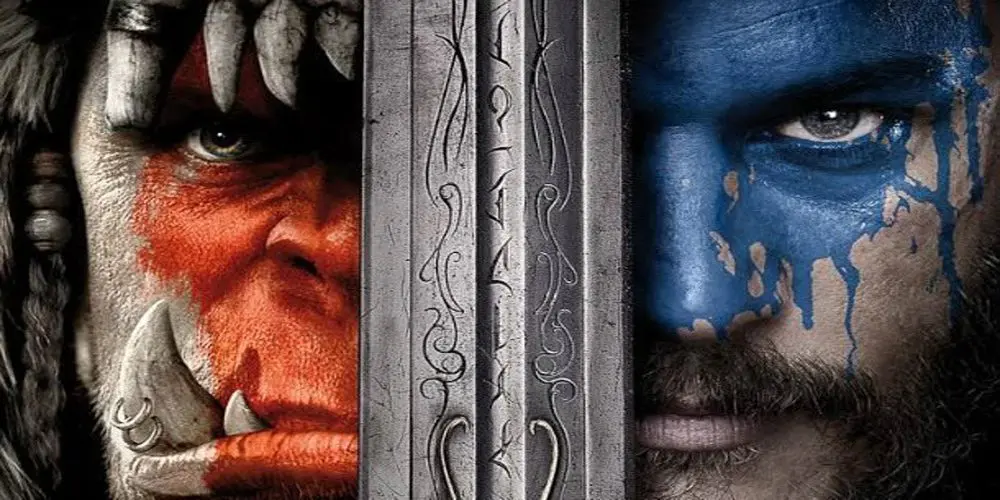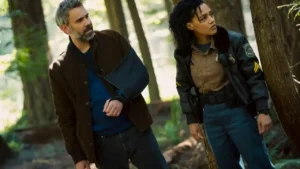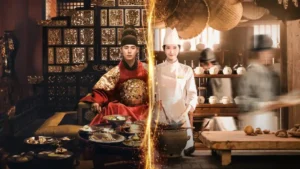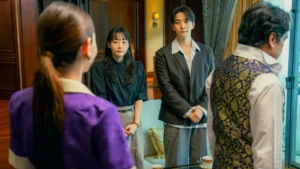Warcraft has the best-looking Orcs I’ve ever seen in a piece of media. Honestly. Despite all the horrible things I’m going to say about this movie, it really is worth pointing that out. The lovingly fabricated, tastefully accessorised horde of Blutoesque marauders is just about the most extraordinarily well-realized thing I saw at the movies last year. And that has to count for something, even if it’s not very much.
Why Orcs? Well, it’s Warcraft. If you’re unfamiliar with the franchise – which is likely, considering I’ve legitimately seen people be assaulted for enjoying it – then here’s a quick primer: It’s a series of video games and assorted multimedia schlock created by Blizzard Entertainment, it really has a hard-on for Orcs, and it long-ago colonised the unwashed stratum of nerd culture that non-gamers imagine when they hear the phrase, “He’s pretty into video games”. This movie is based on the very first game, Warcraft: Orcs and Humans, a real-time strategy title released in 1994. If it didn’t get the Orcs right, there really wouldn’t be any hope at all.
For what it’s worth, it got them right. Not just visually, either; the Orcs are easily the most interesting aspect of the movie, which admittedly is a little like being the best-looking person on the burns unit, but still. There’s some kind of edifying novelty in the hulking invaders being, on balance, quite a reasonable community trying to do right by their families. The games have always been this way, but fantasy filmmaking hasn’t. So when Warcraft opens with a quiet, quite heartfelt scene between an Orc and his pregnant mate, you feel like the movie might be on to something. His name is Durotan, a chieftain played (rather well, as it happens) by a motion-captured Toby Kebbel. He has a friend called Orgrim Doomhammer, which is wonderful. One of his tusks is chipped. He’s also struggling with the idea that the Orc homeland is all kinds of fucked up. If they stay there, they’ll die, including his ladyfriend, Draka (Anna Galvin), and their unborn son. In desperation the Orcs have turned to a green-eyed, soul-sucking warlock, Gul’dan (Daniel Wu), whose swirly peppermint-green magic has opened a portal to the human kingdom of Azeroth. To survive, the Orcs have to invade.
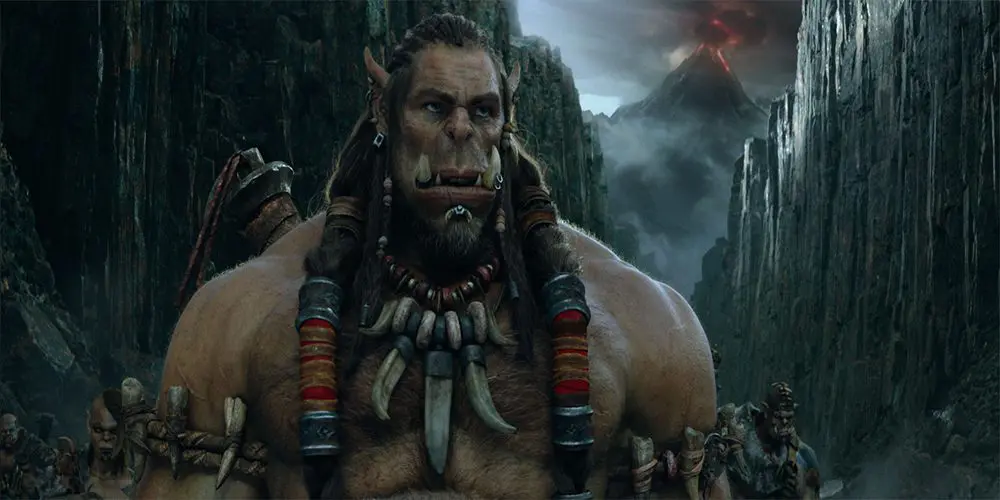
There’s more to it than this, much of it taken from the reams of incurably dorky lore that the movie burns for fuel. And therein lays Warcraft’s single most pernicious problem: It was made by fans. Real, passionate, die-hard fans. In the past I’ve complained, loudly and often, that video game adaptations don’t work on the big screen because they don’t understand or appreciate the source material. And now I find myself in the awkward position of having to criticise a video game adaptation for understanding and appreciating the source material entirely too much. But what can I do when the evidence is right there on the screen? Only a truly enamoured devotee could so effectively smother something in this much meaningless minutiae. So much time and space and energy is devoted to checking innumerable fan-service boxes that the whole thing feels like a gargantuan, multi-million-dollar collector’s item; a fenced-off panorama stuffed with painted figurines. Look, but don’t touch.
Duncan Jones, who directs, is a visionary filmmaker, but even his thorough grasp of cinematic language doesn’t extend far enough to properly grapple with such a fundamentally unwieldy production. The same neurotic attention to detail that makes Warcraft so visually spectacular also makes it flat, soulless and nonsensical. The characters can’t become compelling because they’re never allowed to do anything other than read the Wiki to one another. And the central plot, despite being laughably predictable, is nonetheless unnecessarily complicated by having its mythological underpinnings constantly explained in tortuously minute detail. Even the large-scale, mostly-CGI battle sequences don’t work beyond the facile pleasure of clanging hammers and splattery beheadings. It’s hard to buy into daring rescues and heroic self-sacrifices when you’re still trying to work out who’s who.
Thank goodness for the Orcs, then, because the human contingent is so abominable that were the whole movie centred on them it would have no positive qualities at all. Dominic Cooper plays the surprisingly progressive King Llane, whose tolerance for parlaying with enemy forces and allowing potential spies into his retinue makes him as stupid as it does remarkably boring. Alongside him is his loyal knight, Lothar (Travis Fimmel), doing knightly things, and poor Paula Patton as a half-Orc-half-something-else sexpot called Garona, who sometimes feels like the protagonist and the rest of the time feels like whatever the screenplay needs her to be at any given moment. Elsewhere is Ben Foster’s nakedly suspicious wizard, Medivh, and his busybody apprentice, Khadgar (Ben Schnetzer), both of whom the script relies on to spout tongue-twisting proper nouns and provide nebulous magical reasoning for this and that. It’s an odd assemblage of stars playing an even odder assemblage of characters, chosen, it seems, for how ably they fulfil some arch stereotype requirement or how effectively they deliver exposition, and not for any discernible narrative purpose.
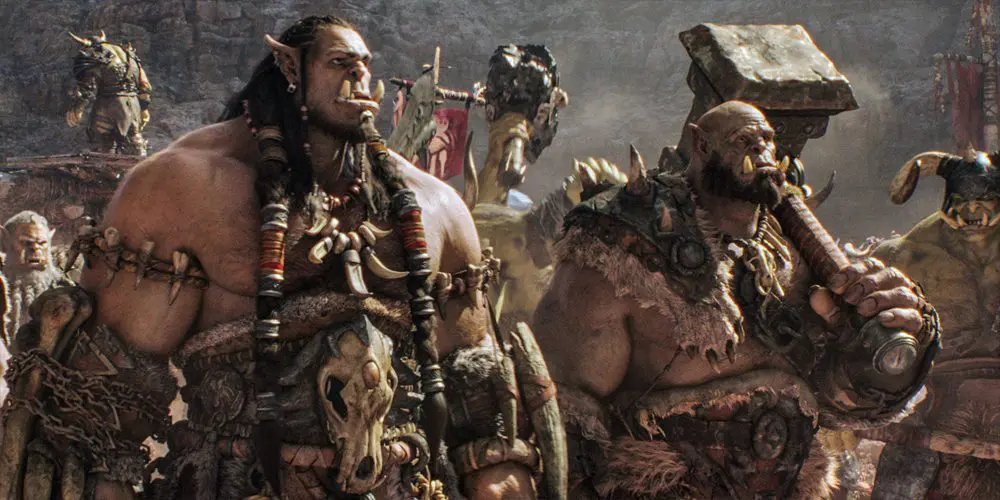
Having said all this, in a Q&A Duncan Jones mentioned that about forty minutes of original footage were cut from the movie. I have no idea why, but the smart money would be on an attempt to meet a perceived “summer blockbuster” length requirement, or a dwindling VFX budget. Who knows? But with that knowledge in mind it’s surprising how many of Warcraft’s problems seem to be attributable directly to it, from the lack of characterisation to the exposition dumps to the abrupt scene changes and wildly inconsistent pacing. Sure, some problems are just baked-in on a conceptual level; this style and this tone of fantasy filmmaking is liable to defeat any director, even one as obviously talented as Jones. But it’s worth considering. I’m not sure that the best way to fix a bad movie is to make it longer, but an Extended Edition might be just what Warcraft needs, and based on how well it’s performing in overseas markets there’s a very good chance that might be exactly what Warcraft gets.
Until then, though, Warcraft is undeniably a colossal failure on almost every conceivable level, and the only reason I haven’t savaged it with more enthusiasm is that I’m reticent to completely eviscerate a video game adaptation that is so visibly cherished by its makers. Had Warcraft swaggered around with the same kind of rights-preserving cynicism as, say, X-Men: Apocalypse, then the gloves would have quickly come off, but really, how cruel can you justifiably be to something that fails in large part because everyone involved in its creation believed so much in it and tried so hard to make it work? I didn’t like this movie, and unless all you want from it is your favourite franchise simply represented onscreen, then I doubt you will either. But I didn’t hate it. It didn’t make me angry. And in a world of small consolations, I’ll happily add that to the pile.

